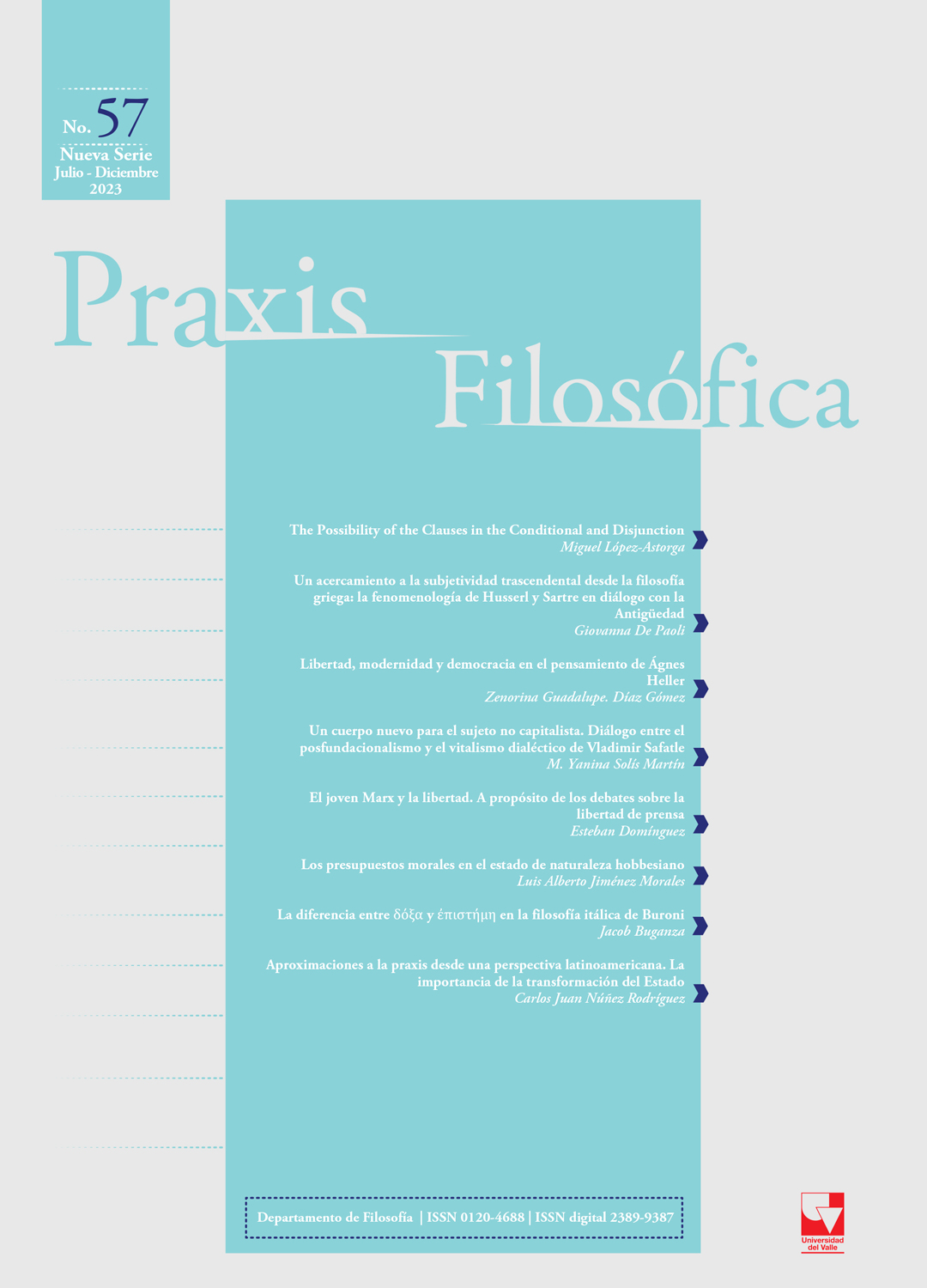La posibilidad de las cláusulas en el condicional y la disyunción
Palabras claves:
Crisipo de Solos ; condicional ; disyunción ; modelos mentales ; razonamiento ;Contenido principal del artículo
La teoría de los modelos mentales ofrece una explicación de cómo los seres humanos infieren conclusiones. Tal explicación no es coherente con la lógica clásica. Admite inferencias que son incorrectas en dicha lógica. Dos de esas inferencias son consideradas aquí. Una de ellas permite derivar que las cláusulas de un condicional son posibles si ese condicional es verdadero. La otra autoriza a deducir que las cláusulas de una disyunción son posibles si esa disyunción es verdadera. Recurriendo al modo que en Crisipo de Solos entiende las relaciones condicionales, este trabajo propone dos axiomas que describen las estructuras de esas dos inferencias. La idea es que tales axiomas podrían ser incluidos en un hipotético sistema axiomático que intentara reproducir cómo son los procesos inferenciales humanos.
Barnes, J., Bobzien, S. & Mignucci, M. (2008). Logic. In K. Algra, J. Barnes, J. Mansfeld, & M. Schofield (Eds.), The Cambridge History of Hellenistic Philosophy (pp. 77-176). Cambridge University Press. https://doi.org/10.1017/CHOL9780521250283.006 DOI: https://doi.org/10.1017/CHOL9780521250283.006
Braine, M. D. S. & O’Brien, D. P. (1998a). The theory of mental-propositional logic: Description and illustration. In M. D. S. Braine & D. P. O’Brien (Eds.), Mental Logic (pp. 79-89). Lawrence Erlbaum Associates, Inc., Publishers.
Braine, M. D. S. & O’Brien, D. P. (1998b). A theory of if: A lexical entry, reasoning program, and pragmatic principles. In M. D. S. Braine & D. P. O’Brien (Eds.), Mental Logic (pp. 199-244). Lawrence Erlbaum Associates, Inc., Publishers.
Byrne, R. M. J. & Johnson-Laird, P. N. (2020). If and or: Real and counterfactual possibilities in their truth and probability. Journal of Experimental Psychology: Learning, Memory, and Cognition, 46(4), 760-780. https://doi.org/10.1037/xlm0000756 DOI: https://doi.org/10.1037/xlm0000756
Deaño, A. (1999). Introducción a la lógica formal. Alianza Editorial.
Espino, O., Byrne, R. M. J. & Johnson-Laird, P. N. (2020). Possibilities and the parallel meanings of factual and counterfactual conditionals. Memory & Cognition, 48(7), 1263-1280. https://doi.org/10.3758/s13421-020-01040-6 DOI: https://doi.org/10.3758/s13421-020-01040-6
Goodwin, G. P. & Johnson-Laird, P. N. (2018). The truth of conditional assertions. Cognitive Science, 42(8), 2502-2533. https://doi.org/10.1111/cogs.12666 DOI: https://doi.org/10.1111/cogs.12666
Gould, J. B. (1970). The Philosophy of Chrysippus. State University of New York Press. https://doi.org/10.1163/9789004320369 DOI: https://doi.org/10.1163/9789004320369
Johnson-Laird, P. N. (2010). Against logical form. Psychologica Belgica, 50(3-4), 193-221. http://doi.org/10.5334/pb-50-3-4-193 DOI: https://doi.org/10.5334/pb-50-3-4-193
Johnson-Laird, P. N. & Ragni, M. (2019). Possibilities as the foundation of reasoning. Cognition, 193, 103950. https://doi.org/10.1016/j.cognition.2019.04.019 DOI: https://doi.org/10.1016/j.cognition.2019.04.019
Johnson-Laird, P. N., Khemlani, S. & Goodwin, G. P. (2015). Logic, probability, and human reasoning. Trends in Cognitive Sciences, 19(4), 201-214. https://doi.org/10.1016/j.tics.2015.02.006 DOI: https://doi.org/10.1016/j.tics.2015.02.006
Johnson-Laird, P. N., Quelhas, A. C. & Rasga, C. (2021). The mental model theory of free choice permissions and paradoxical disjunctive inferences. Journal of Cognitive Psychology, 33(8), 951-973. https://doi.org/10.1080/20445911.2021.1967963 DOI: https://doi.org/10.1080/20445911.2021.1967963
Khemlani, S., Byrne, R. M. J. & Johnson-Laird, P. N. (2018). Facts and possibilities: A model-based theory of sentential reasoning. Cognitive Science, 42(6), 1887-1924. https://doi.org/10.1111/cogs.12634 DOI: https://doi.org/10.1111/cogs.12634
Khemlani, S., Hinterecker, T. & Johnson-Laird, P. N. (2017). The provenance of modal inference. In G. Gunzelmann, A. Howes, T. Tenbrink & E. J. Davelaar (Eds.), 39th Annual Meeting of the Cognitive Science Society (CogSci 2017). Computational Foundations of Cognition (pp. 663-668). Cognitive Science Society.
Lenzen, W. (2019). Leibniz’s laws of consistency and the philosophical foundations of connexive logic. Logic and Logical Philosophy, 28(3), 537-551. http://dx.doi.org/10.12775/LLP.2019.004 DOI: https://doi.org/10.12775/LLP.2019.004
López-Astorga, M. (2017). A proposal for a syntactic solution of the problems of disjunction in human thought. Praxis Filosófica, (45S), 101-112. https://doi.org/10.25100/pfilosofica.v0i45s.6123 DOI: https://doi.org/10.25100/pfilosofica.v0i45S.6123
López-Astorga, M. (2021a). Stoic Logic Allows Understanding a Priori Falsity in the Conditional. Studies about Languages, (39), 33-40. https://doi.org/10.5755/j01.sal.1.39.28184 DOI: https://doi.org/10.5755/j01.sal.1.39.28184
López-Astorga, M. (2021b). Reminiscence theory and immortality of the soul: Some mental representations in Plato’s Phaedo. Annals of the University of Craiova Philosophy Series, 48(2), 5-14. DOI: https://doi.org/10.52846/afucv.v2i48.6
O’Brien, D. P. (2014). Conditionals and disjunctions in mental-logic theory: A response to Liu and Chou (2012) and to López-Astorga (2013). Universum, 29(2), 221-235. https://doi.org/10.4067/S0718-23762014000200015 DOI: https://doi.org/10.4067/S0718-23762014000200015
O’Toole, R. R. & Jennings, R. E. (2004). The Megarians and the Stoics. In D. M. Gabbay & J. Woods (Eds.), Handbook of the History of Logic, Volume 1. Greek, Indian and Arabic Logic (pp. 397-522). Elsevier. https://doi.org/10.1016/S1874-5857(04)80008-6 DOI: https://doi.org/10.1016/S1874-5857(04)80008-6
Orenes, I. & Johnson-Laird, P. N. (2012). Logic, Models, and Paradoxical Inferences. Mind & Language, 27(4), 357-377. https://doi.org/10.1111/j.1468-0017.2012.01448.x DOI: https://doi.org/10.1111/j.1468-0017.2012.01448.x
Quelhas, A. C., Rasga, C. & Johnson-Laird, P. N. (2019). The Analytic Truth and Falsity of Disjunctions. Cognitive Science, 43(9), e12739. https://doi.org/10.1111/cogs.12739 DOI: https://doi.org/10.1111/cogs.12739
- Miguel López-Astorga, La teoría de la disciplina formal y la lógica mental (En) , Praxis Filosófica: Núm. 41 (2015): Praxis Filosófica No. 41 julio-diciembre 2015
- Miguel López-Astorga, Aristóteles y Boecio: dos tesis y sus posibilidades , Praxis Filosófica: Núm. 53 (2021): Praxis Filosófica No. 53 julio-diciembre 2021
- Miguel López-Astorga, ‘But’ and its role in the building of mental representations , Praxis Filosófica: Núm. 50 (2020): Núm. 50 (2020): Praxis Filosófica No. 50
- Miguel López-Astorga, Cuantificadores, disyunción y valores de verdad con dos números , Praxis Filosófica: Núm. 62 (2025): Praxis Filosófica No. 62 julio-diciembre 2025

Esta obra está bajo una licencia internacional Creative Commons Atribución-NoComercial-CompartirIgual 4.0.
De acuerdo con nuestra política (Licencia Creative Commons CC BY-NC-SA 4.0) los artículos presentados y sometidos al proceso editorial en la revista Praxis Filosófica no tienen costo alguno para sus autores ni retribuciones económicas para la revista. El artículo de carácter inédito, producto de investigación o de algún proyecto que se presente a Praxis Filosófica, no podrá estar sometido a otro proceso de publicación durante el proceso que se lleve en nuestra revista.





